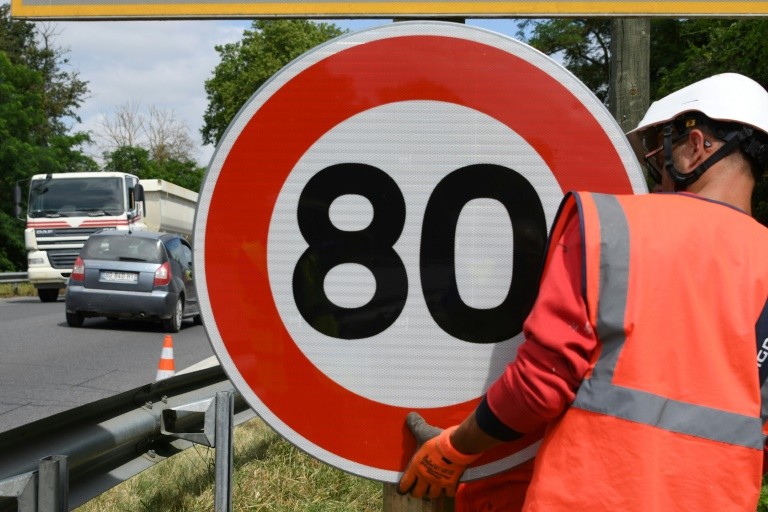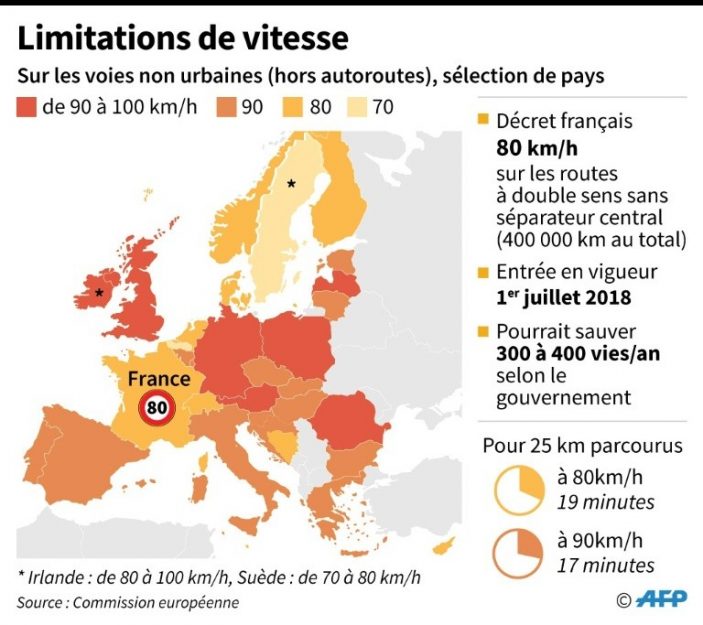It’s Done, Secondary Roads are now Limited to 80 km/h

After months of disputes, the change of the speed limits from 90 to 80 km/h on secondary roads is effective since Sunday 1st July
Despite months of protest and controversy, the measure of reducing the speed limits comes into effect this Sunday, July 1st: 400,000 kilometers of roads are now limited to 80 km/h, not 90 km/h, with the aim of reducing the number killed on the roads.
As the summer departures are looming, French and foreign drivers will have to lift their feet. The maximum authorized speed is lowered on all two-way roads, one lane each, without central separator (barrier, solid ground …), or 40% of the French road network.
A “useless” and “political” measure
Since the announcement on the 9th January, associations of motorists and motorcyclists have multiplied the demonstrations and petitions face a measure “useless” and “political”, according to Pierre Chasseray, general delegate of 40 million motorists.
Parliamentarians and local elected representatives from all sides have protested against this provision, which, according to them, penalizes rural areas, where most of the roads concerned are located. In vain.
The executive remained uncompromising, led by Prime Minister Edouard Philippe, who always said he was “ready to assume the unpopularity” of the measure. Despite the spots and media campaigns in recent weeks, 74% of French declared themselves opposed in a poll Tuesday.
400 lives saved each year, according to the executive
“The goal is not to annoy the world. The goal is to ensure that there are fewer deaths and fewer serious injuries, “said Edouard Philippe Friday, recalling the” horrific human cost “of road accidents that have left 3684 dead and 76,840 injured in 2017
According to the government, lowering the speed by 10 km/h will save up to 400 lives per year, thus reversing the long-term road mortality curve which, after reaching a record low in 2013, has a worrying rebound between 2014 and 2016.
“Money pump”
According to Road Safety, these roads have concentrated 55% of all fatalities in 2017.
“Speed is the number one cause of fatal accidents and when it is not a cause, it is an aggravating factor of accidents”, adds the president of the League against road violence Chantal Perrichon, who militates for years for the 80 km/h.
The government has announced that it will assess the impact of the measure as of 1st July, 2020.
For the last six months, associations of motorists and bikers dispute its effectiveness in terms of road safety, as well as the “passage in force” of the government to impose on the opinion.
On Saturday, a few hundred bikers showed their “anger” in Paris by calling the measure “aberrant” and “money pump”.
“It’s just a monstrous racket, they do not know what to do to find money. It will anoy the country, it will create traffic jams and accidents. It’s completely absurd, “protested Gilles, 59, one of the protesters.
“Parisianist” measure
Elected officials, particularly from rural areas, denounce a “Parisianist” measure to the detriment of campaigns that already feel isolated and neglected.
Within the government, Interior Minister Gérard Collomb and Territorial Cohesion Minister Jacques Mézard have not hidden their reserve.
Since the publication of the decree on the 17th June, the vast majority of local elected officials, however, have even minimally complied with their obligations and have had signs posted indicating the new speed limit.
Some, however, are reluctant, especially in Indre-et-Loire and Creuse, where the president (LR) of the departmental council Valérie Simonet announced that it would put no means “neither financial nor technical, nor human” for this reform .
Three appeals filed
“These few elected to marginalize the legality, which is embarrassing for a public authority. Do not give the right indications, it is to take the motorists the risk of a fine or worse, an accident, “laments the Interministerial Delegate for Road Safety, Emmanuel Barbe.
“There are ways of right” to challenge, he adds, with reference to three appeals filed before the Council of State.
In Corrèze, the department chose to protest with irony. No signs at 80 km / h have been installed. The authorities preferred to report the end of the zones at 90 km/h with inscriptions “The new world asks you to slow down”.

Enjoyed this? Get the week’s top France stories
One email every Sunday. Unsubscribe anytime.


